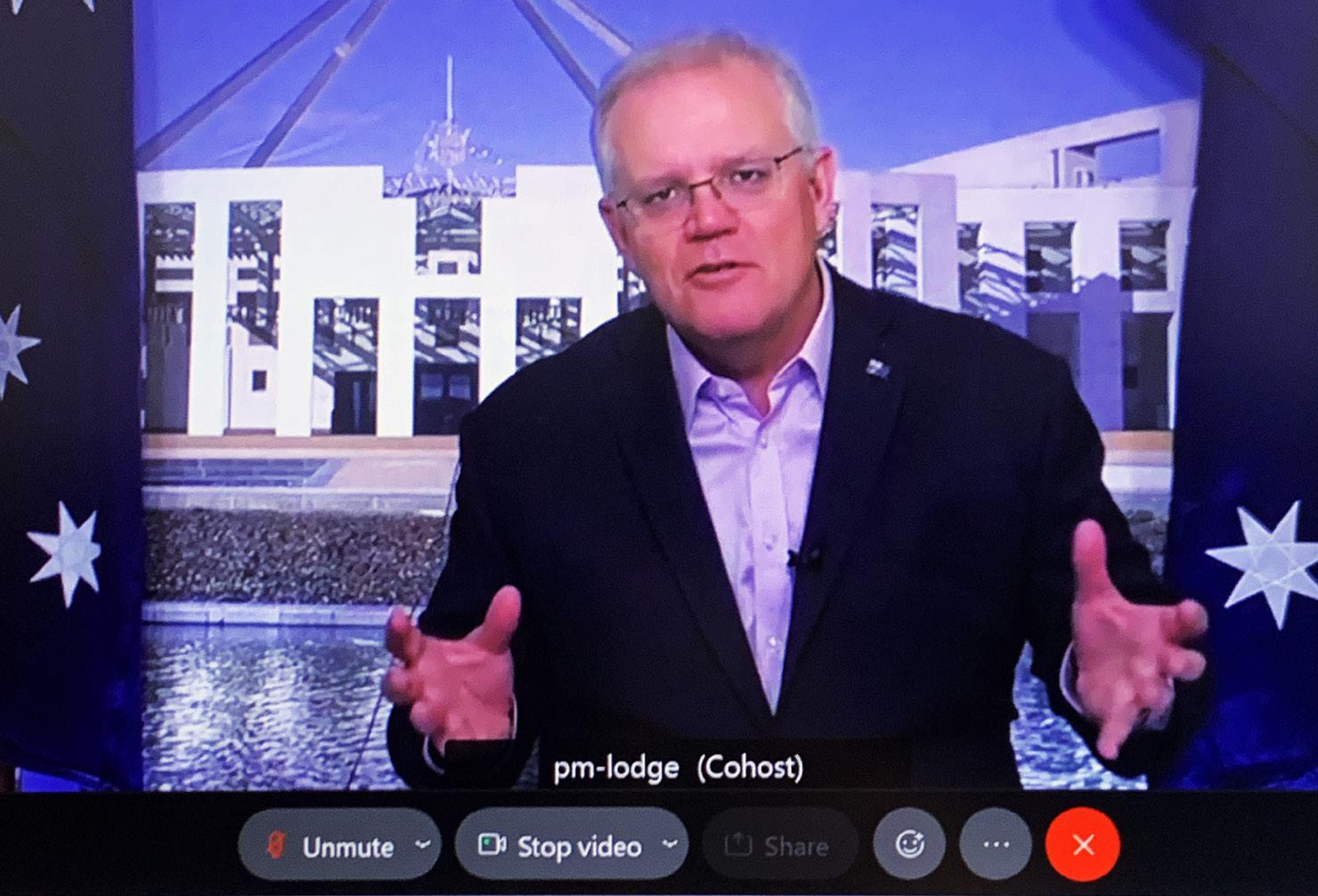
20 minute read
India going through remarkable transformation of its economy, says PM Morrison
CANBERRA, Sept 30: Australian Prime Minister Scott Morrison said that India is going through a remarkable transformation of its economy while talking about the partnership between the two countries on new energy economy.
While speaking during an online briefing with Indian media, he said, "The ability to take up technology at a scale that is commercial is the key to successfully transitioning to the new energy economy. And India understands that. And India is going through a remarkable transformation of its own economy and looking to actually transition its own energy economy into the future." Recently, in the first in-person Quad Leaders' Summit, both Prime Ministers Narendra Modi and Morrison agreed on a number of initiatives, including the agreement to go forward with a low emissions technology partnership.
Advertisement
Australia's approach to the new energy economy is transitioning to net zero over the next 30 years. With the vision to ensure technologies enable economies to continue to grow and develop and create jobs and make things, PM Morrison said, "But, to do that in a way that is patient, which is sensible, which is practical, and so, working together on technologies, I think, is one of the, one of the key partnerships that you can have to ensure that both of our countries are able to go through this transition period. But, more than that, demonstrate that this is how you do it, that this isn't just about setting targets and doing these things. It's the how that matters."
He said that such technology is not only for advanced economies but is supposed for the whole world. He also said that at the Quad meeting last week, there is a great deal of enthusiasm all around the world regarding the new energy economy.
"I have no doubt, for trying to move our economies into this, this new energy economy, to move it into an economy that understands the impacts of carbon emissions," added Morrison. technologies, that actually enable us all to get there, and we actually can achieve this. This can be done. It's been done many, many times in world history," said Morrison.
He further reiterated that both he and PM Modi share a passion on the practical when it comes to transitioning both economies.
"And the low emissions technology partnership will particularly look at ultra low cost solar and hydrogen supply chains linking into India. And we see that as a big opportunity for both countries," said Australian PM.
Australia has long been an energy exporter to India. Morrison said that this will continue, adding that in addition to that, a whole new line will open up.
"Our Comprehensive Strategic Partnership further, is becoming more ambitious, and our trade ministers will be meeting, I understand next week. We have both tasked our ministers to be ambitious about where we can get to. And I think we will be able to get a lot further in a bilateral sense with India and Australia together. And the Prime Minister and I share that objective," said Morrison.
Talking about challenges to get the right deal, he said, "We want the right deal for both countries. And, so we will continue to be patient about it and take the gains where we can take them and see this as a road that we are on, and we will just keep adding and adding and adding I think to the strength of that Comprehensive Economic Cooperation Agreement that we're seeking."
He said that zero-carbon energy technologies can be achieved and that is what both prime ministers discussed at the Quad meeting.
"That's what the Prime Minister and I are very committed to achieving, a practical energy technology partnership that enables zero-carbon energy technologies and even sub-zero carbon technologies and transition
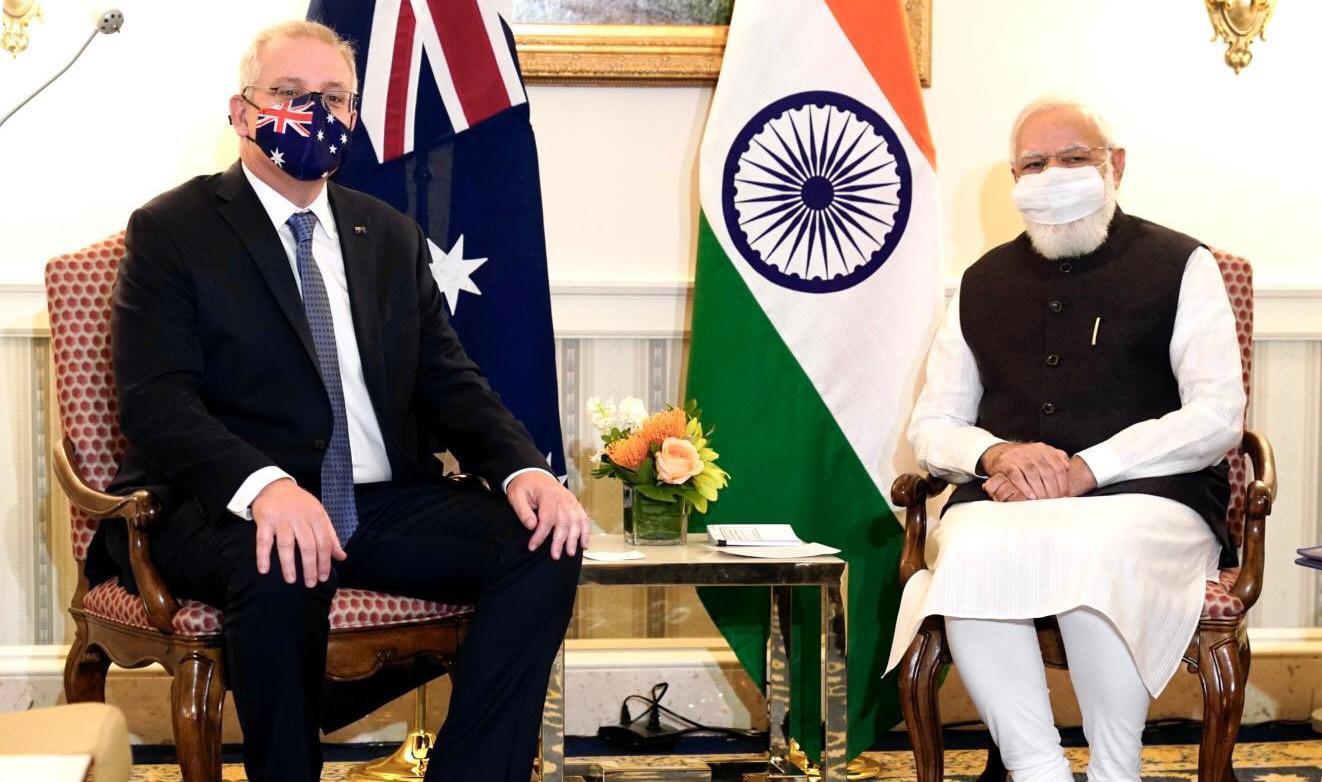
Australia’s Next Steps to Reopen to The World
CANBERRA, Oct 1: Australia is ready to take its next steps to safely reopen to the world, with changes coming to the international border.
Our government is setting out the framework for how international travel will look in coming months.
With first dose vaccination rates at over 78 per cent and double dose rates nationwide at 55 per cent and on track to reach 70 per cent in some jurisdictions over the next week, our government has been finalising plans so Australian families can be reunited, Australian workers can travel in and out of our country, and we can work towards welcoming tourists back to our shores.
Within weeks, large parts of the country will be moving to Phase B and then to Phase C of the National Plan to safely reopen Australia and to stay safely open. Under Phase C, international travel is on track to reopen safely to fully vaccinated Australian travellers. Many countries around the world have now safely reopened to international travel and it will shortly be time for Australia to take the next step.
To enable fully vaccinated Australians to travel, our government is finalising new arrangements.
Following completion of home quarantine pilots in New South Wales and South Australia, it is anticipated that states and territories that are ready to do so will roll out: • Seven-day home quarantine for Australian citizens and permanent residents fully vaccinated with a vaccine approved for use in Australia or ‘recognised’ by the Therapeutic Goods Administration (TGA) • 14-day managed quarantine for anyone not vaccinated or vaccinated with a vaccine not approved or recognised by the TGA.
Australian citizens and permanent residents who cannot be vaccinated - for example if they are under 12 or have a medical condition - will be treated as vaccinated for the purposes of their travel.
States and territories will begin this program at different times given their varying vaccination rates, but we expect the system to commence in November.
Under Phase B and C of the National Plan, 14-day managed quarantine caps apply to unvaccinated arrivals. These will return to previous levels at Phase B of the National Plan. We will work with states and territories to remove all travel caps on vaccinated Australians.
In line with the National Plan, our government is balancing the need to minimise the risk that the spread of COVID-19 presents, with the need to live with the virus.
The Government’s intention is that once changes are made in November, the current overseas travel restrictions related to COVID-19 will be removed and Australians will be able to travel subject to any other travel advice and limits, as long as they are fully vaccinated and those countries’ border settings allow. Border settings and quarantine requirements in other countries continue to change and we strongly encourage all Australians to closely monitor DFAT travel advice, available on smartraveller.gov.au.
These changes mean there will be no travel restrictions if you are a vaccinated Australian entering or leaving our shores.
We will also work towards completely quarantine-free travel for certain countries, such as New Zealand, when it is safe to do so.
Testing is expected to continue to be a requirement of international travel, but subject to further medical advice, Rapid Antigen Tests may be used.
Australians who want to travel overseas once restrictions are removed will be able to access an internationally recognised proof of vaccination document in the coming weeks to prove their vaccination status abroad. The proof of vaccination for international travel will include a QR code that is readable globally and will comply with the standards set out by the International Civil Aviation Organisation. Engagement with commercial airlines and foreign governments has already begun to ensure they are familiar with the system.
We know it has been an extraordinarily difficult 18 months for Australians overseas trying to come home and for Australians with family and friends overseas.
To maximise the number of Australians who can return, our government is also offering facilitated flights into any state or territory that agrees to commence seven day home quarantine trials for returning Australians.
More than 680,000 Australians have returned since the Government recommended people reconsider the need to travel abroad in March last year. The Government stands ready to assist more people to return with the cooperation of states and territories.
Australian citizens and permanent residents who have been vaccinated with a TGA-approved vaccine overseas can already visit their GP or local pharmacist in Australia to have their COVID-19 vaccination status updated in the Australian Immunisation Register, to be able to show proof of vaccination in Australia.
In coming weeks, the government will finalise the processes for people to be able to show their vaccination status if they have had a TGA ‘recognised vaccine’. People who have received vaccines not recognised by the TGA, or who are unvaccinated, will be required to undertake 14 days of managed quarantine on arrival.
In addition to the four COVID-19 vaccines that have been approved and registered for use by the TGA - Pfizer (Comirnaty), AstraZeneca (Vaxzevria), Moderna (Spikevax) and COVID-19 Vaccine Janssen - the TGA has also been reviewing other vaccines in widespread use around the world for the purposes of determining ‘recognised vaccines’.
We need to ensure that we keep Australians safe without creating unnecessary obstacles to people who have been fully vaccinated overseas from coming to our country.
Today, the TGA has published its initial assessment of the data on the protection offered by the Coronavac (Sinovac) and Covishield (AstraZeneca/Serum Institute of India) vaccines and has advised that these vaccines should be considered as ‘recognised vaccines’ for the purpose of determining incoming international travellers as being appropriately vaccinated.
Declaring certain COVID-19 vaccines as ‘recognised vaccines’ is separate to a regulatory decision on whether they are approved for use for vaccination in Australia, which has not been made by the TGA.
The recognition of these two additional vaccines is a major milestone towards more Australians vaccinated overseas getting home sooner.
The TGA will continue its assessment of other vaccines for the purpose of determining ‘recognised vaccines’ based on the available data and data that is provided.
In coming weeks, the Minister for Health will consider updates to the Biosecurity Act Emergency determinations to facilitate some of these changes for fully vaccinated Australian travellers as we move forward on the National Plan to get Australia back to normal and reopen our country safely.
(MEDIA RELEASE)
JOINT MEDIA STATEMENT
The Hon. Scott Morrison MP (Prime Minister), The Hon. Barnaby Joyce MP (Deputy Prime Minister, Minister for Infrastructure, Transport and Regional Development), Senator the Hon. Marise Payne (Minister for Foreign Affairs
Minister for Women), The Hon. Greg Hunt MP (Minister for Health and Aged Care),
The Hon. Dan Tehan MP (Minister for Trade, Tourism and Investment), The Hon. Karen Andrews MP (Minister for Home Affairs), The Hon. Stuart Robert MP (Minister for Employment, Workforce, Skills, Small and Family Business).
16 NEWS INDIA Modi launches Ayushman Bharat Digital Mission
NEW DELHI, Sep 27: Prime Minister Narendra Modi said that digital infrastructure was taking everything from 'Ration to Prashasan' (ration to administration) to the common Indian in a fast and transparent manner.
Prime Minister Modi was speaking after launching the 'Ayushman Bharat Digital Mission' through a video conference.
Speaking on the occasion, the Prime Minister said that the campaign for strengthening the health facilities, that have been going for the last seven years, is now entering a new phase. "Today we are launching a mission that has the potential of bringing a revolutionary change in India's health facilities," Modi said.
The Prime Minister underlined that with 130 crore Aadhaar numbers, 118 crore mobile subscribers, about 80 crore Internet users and about 43 crore Jan Dhan bank accounts, there is no such big connected infrastructure
anywhere in the world. "This digital infrastructure is bringing everything from ration to administration (Ration to Prashasan) to the common Indian in a fast and transparent manner. The way technology is being deployed in governance reforms today is unprecedented," the Prime Minister said.
The Prime Minister pointed out that the 'Arogya Setu' app helped a lot in preventing the spread of corona infection. He lauded Co-WIN for its role in making India achieve a record administration of about 90 crore vaccine doses today, under the free vaccine campaign.
Continuing with the theme of the use of technology in health, the Prime Minister said that there has also been an unprecedented expansion of telemedicine during the Covid pandemic period. So far about 125 crore remote consultations have been completed through e-Sanjeevani. "This facility is connecting thousands of countrymen living in far-flung parts of the country every day with doctors of big hospitals of cities while sitting at home," he said.
The Prime Minister remarked that Ayushman Bharat-PMJAY has addressed a key headache in the lives of the poor and so far more than two crore countrymen have availed the facility of free treatment under this scheme, half of which are women.
The Prime Minister emphasized that diseases are one of the key reasons to push families into the vicious cycle of poverty and women of the families are the worst sufferers as they always relegate their health issues to the background.
Modi said that he has made it a point to personally meet some beneficiaries of Ayushman and has experienced the benefits of the scheme during the interactions. "These healthcare solutions are a big investment in the present and future of the country," he said.
The Prime Minister said that Ayushman Bharat - Digital Mission will now connect the digital health solutions of hospitals across the country with each other and the Mission will not only make the processes of hospitals simplified but also will increase ease of living.
Under this, every citizen will now get a digital health ID and their health record will be
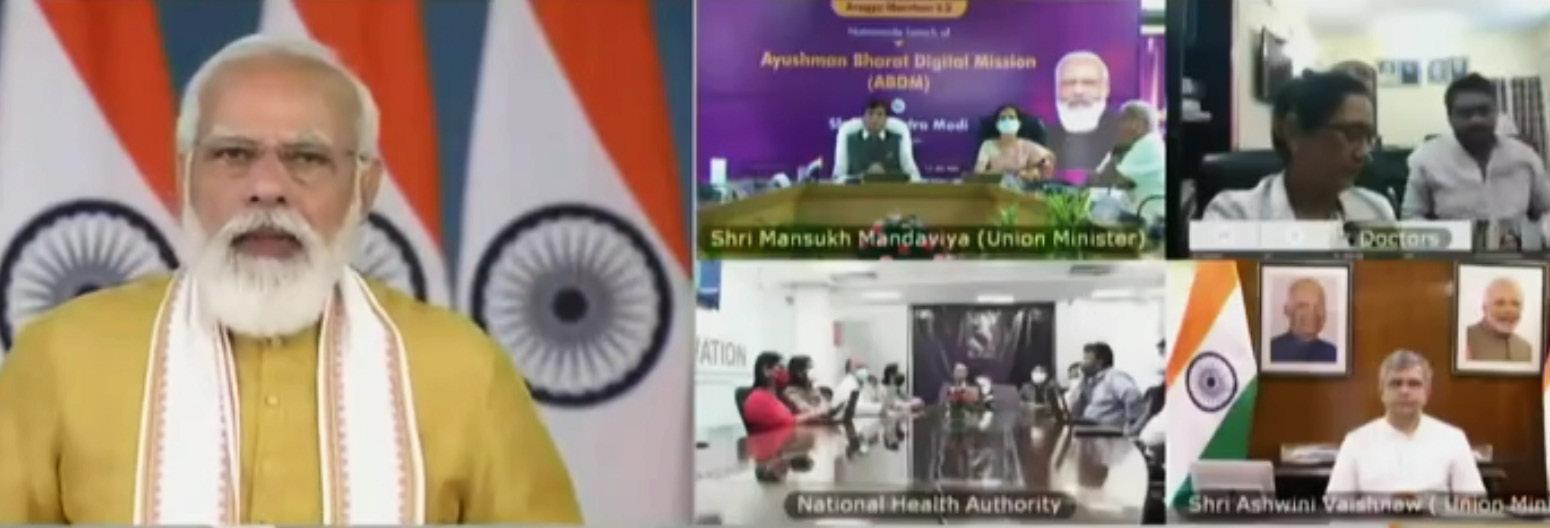
digitally protected.
The Prime Minister mentioned that India is working on a health model that is holistic and inclusive. "A model which stresses preventive healthcare and, in case of disease, easy, affordable and accessible treatment," he said.
He also discussed unprecedented reforms in health education and said a much larger number of doctors and para medical manpower is being created in India now as compared to seven- eight years ago.
He further mentioned that a comprehensive network of AIIMS and other modern health institutions is being established in the country and work on establishing one medical college in every three Lok Sabha constituencies is going on.
He also talked about strengthening the health facilities in villages and informed that in the villages, primary health centre networks and wellness centres are being strengthened. "More than 80,000 such centres have already been operationalised," the Prime Minister said.
Referring to 'World Tourism Day' observed on Monday, the Prime Minister said that health has a very strong relationship with tourism because when our health infrastructure is integrated, strengthened, it also improves the tourism sector.
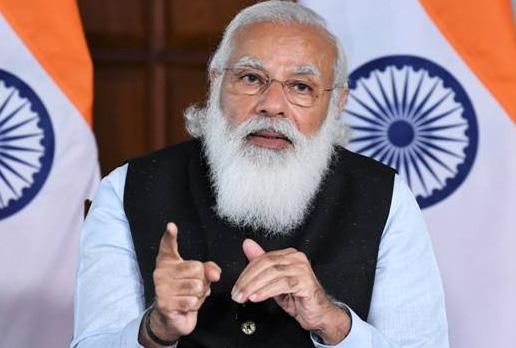
NEW YORK, Sep 25: Quad will bring peace and prosperity to the Indo-Pacific region and the world with its positive approach, Prime Minister Narendra Modi has said at the start of the summit of its four leaders in Washington. "On the basis of democratic values, Quad with positive ideas and a positive approach is determined to move forward," Modi said on Friday at the White House seated around a flower-bedecked island with the other leaders, President Joe Biden and Prime Ministers Yoshihide Suga of Japan and Scott Morrison of Australia. "Whether it is supply chain, security, climate action, Covid response, or technology cooperation, I am happy to discuss them with our friends," he said speaking in Hindi. "Our Quad is united as a force for good to work for the world," he said. "I am confident that our Quad assistance in the Indo-Pacific and in the world will bring peace and prosperity," he added.
Biden welcomed the leaders and said that their vaccine initiative launched at their virtual summit in March to provide one billion does to the Indo-Pacific region was on track and announced the STEM programme that will give 25 scholarships to students from each of the four countries to pursue graduate education in the US.
Suga and Morrison stressed the importance of Indo-Pacific security in their opening remarks.
Suga said, "This event demonstrates strong solidarity between our four nations and an unwavering commitment to a free and open Indo-Pacific."
Morrison said, "We believe in a free and open Indo-Pacific because that is what delivers a prosperous region. The Quad is about demonstrating how democracies such as ours, as you said Mr President, can get things done."
The first in-person summit of the Quad will seek to "elevate" the group, as Biden said at the UN this week, "to take on challenges ranging from health security to climate to emerging technologies, engaging with regional institutions".
Random dope test on air crew, traffic controllers to commence from 2022
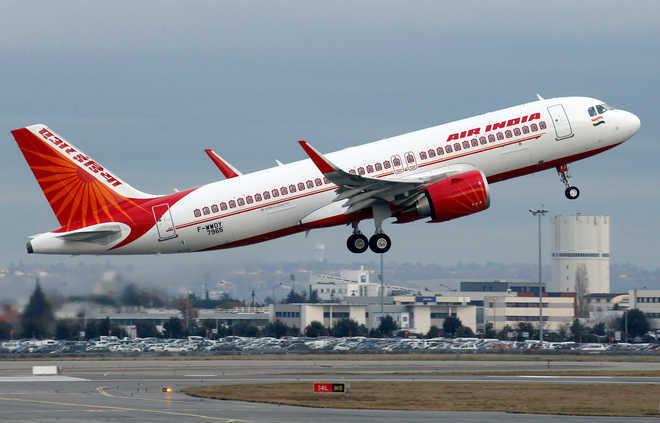
NEW DELHI, Sep 27: India's civil aviation regulator announced it will institute random drug testing on flight crews and air traffic controllers, effective from January 31, 2022.
The Directorate General of Civil Aviation (DGCA) said that provisions of the 'Civil Aviation Requirements' rules are applicable on aircraft operators, MROs, FTOs, and air navigation service providers.
The CAR requires random testing to trace the presence of psychoactive substances such as amphetamine and amphetamine type stimulants, opiates and metabolites, cannabis (marijuana) as 'THC', cocaine, barbiturates, and benzodiazepine. "All scheduled commercial aircraft operators and air navigation service provider shall carry out random drug testing for the consumption of psychoactive substance by flight crew members and air traffic controllers employed by them respectively at the facilities established by them using the services of an appropriate laboratory." "The medical personnel of the concerned organization shall associate during this process. The programme shall ensure that at least 10 per cent of the employees of an organisation are covered in a year."
Besides, the DGCA said that these organisations shall ensure testing before employing a person, before admitting a trainee pilot in a FTO, follow-up testing of confirmed cases, and at first available opportunity, in case an aviation personnel has refused drug test to a foreign regulator during flight operation to that country.
"Organisations should encourage their employees for self-declaration regarding use of psychoactive substance. Such employees shall be subjected to rehabilitation process by the organisation before return to the active duty." "Number of such cases shall be reported to DGCA on a six months basis."
Furthermore, organisations have been asked to educate their employees about the prescription drugs that contain such substances.
In addition, the CAR mentions that these tests shall be carried out "post flight or post shift or anytime during the duty period as the case may be. It shall not be carried out, while an employee is on leave or on rest period". "The pre-flight testing requirement will be introduced in due course, all the applicable organization are required to build capacity or infrastructure for the same."
In terms of penalties, the CAR mentioned that if screening test is non-negative, the employee shall be immediately removed from the safety sensitive duty till a confirmatory report is received. "In case of positive confirmatory test for the first time, the concerned employee shall be referred by the organisation to a 'specialist doctor or counsellor or de-addiction' centre for de-addiction or rehabilitation programme as applicable, in consultation with the MRO." "Such an employee shall return to active duties after again having undergone the tests for the consumption of the psychoactive substance with a negative test report. In addition, fitness certificate by the medical in charge of the concerned organisation shall be required."
In case, an employee who has returned to safety sensitive duties after having been tested positive and is again found positive in the confirmatory test (second occasion), then the license of such person shall be suspended for period of three years and for third positive occasion, the license shall be cancelled.
(IANS)
NEW DELHI, Sep 27: About 99 per cent of Indian business travellers aim to resume work trips within the next 12 months, a new study showed.
Over 78 per cent are "very willing" to get back on work trips which is higher than the global average.
The study commissioned by SAP Concur Respondents was carried out in India, Singapore, Malaysia, China, Hong Kong, Taiwan, Japan, South Korea, Australia, and New Zealand.
While professionals are eager to restart inperson meetings soon, they also want greater control over how they will travel, so that their safety and health can be better safeguarded amidst the pandemic. "While uncertainty continues to linger around travel curbs, firms can support business travellers by updating travel policies to provide more flexibility in flight and accommodation selection, better protecting employees' health and safety. Then as vaccinations progress and travel bubbles form in the coming months, they will be better positioned to enable safe travel, facilitating business growth and talent retention," Carl Jones, Vice President and Head of Strategy for SAP Concur Asia Pacific, said.
These concerns include: the difficulty in developing and maintaining business connections (59 per cent in India compared to 45 per cent globally), not advancing in their career (43 per cent compared to 33 per cent globally) and making less money (40 per cent compared to 38 per cent globally).
On the business front, Indian respondents worry that if their organisation does not increase business travel, it will be difficult to sign new deals (47 per cent), build new relationships (41 per cent), and renew contracts with existing clients (43 per cent). Overall, in the Asia-Pacific region, 9 per cent are afraid their business will shut down, and 14 per cent worry that they will lose their jobs.
Indian SMBs are more worried about cyber threats than before
NEW DELHI, Sep 27: Three out of four (74 per cent) small and mediumsized businesses (SMBs) in India suffered a cyber incident in the past year, resulting in 85 per cent losing customer information to malicious actors, in addition to a tangible impact on business, a new study by Cisco revealed.
According to the study, titled 'Cybersecurity for SMBs: Asia Pacific Businesses Prepare for Digital Defence', more than half (62 per cent) of SMBs in India that suffered cyber incidents in the past 12 months said that cyber-attacks cost their business more than Rs 3.5 crore. Of these, 13 per cent say that the cost was over Rs 7 crore. "As they digitise, SMBs are embracing the fact that any transformation, especially one that allows them to meet customers where they are and build trust, must begin with cybersecurity," Panish P.K., Managing Director - Small Business, Cisco India and SAARC, said.
The study is based on an independent, double-blinded survey of over 3,700 business and IT leaders with cybersecurity responsibilities across 14 markets across the Asia Pacific region.
The survey highlighted that SMBs saw several ways in which attackers tried to infiltrate their systems. In India, malware attacks, which affected 92 per cent of SMBs, topped the charts, followed by phishing (76 per cent). 38 per cent of those that suffered incidents said that the number one cause was not having cybersecurity solutions.
Meanwhile, 36 per cent ranked cybersecurity solutions not being adequate to detect or prevent the attack as the number one reason.
Besides the loss of customer data, SMBs that suffered a cyber incident also lost internal emails (73 per cent), employee data (71 per cent), intellectual property (74 per cent), and financial information (75 per cent). In addition, 73 per cent of those said it disrupted their operations, 76 per cent admitted it negatively impacted their reputation, and more than half (70 per cent) said it resulted in a loss of customer trust.
However, SMBs are rising to the challenge. The study highlights that they are taking strategic measures like carrying out simulation exercises to improve their cybersecurity posture.
(IANS)



